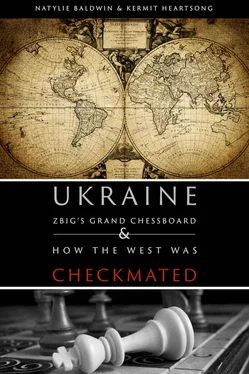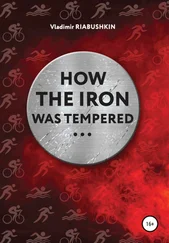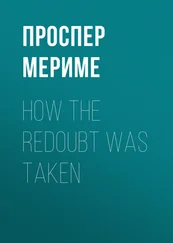Kermit Heartsong - Ukraine - ZBIG's Grand Chess Board & How The West Was Checkmated
Здесь есть возможность читать онлайн «Kermit Heartsong - Ukraine - ZBIG's Grand Chess Board & How The West Was Checkmated» весь текст электронной книги совершенно бесплатно (целиком полную версию без сокращений). В некоторых случаях можно слушать аудио, скачать через торрент в формате fb2 и присутствует краткое содержание. Год выпуска: 2015, Жанр: Политика, на английском языке. Описание произведения, (предисловие) а так же отзывы посетителей доступны на портале библиотеки ЛибКат.
- Название:Ukraine: ZBIG's Grand Chess Board & How The West Was Checkmated
- Автор:
- Жанр:
- Год:2015
- ISBN:нет данных
- Рейтинг книги:4 / 5. Голосов: 1
-
Избранное:Добавить в избранное
- Отзывы:
-
Ваша оценка:
- 80
- 1
- 2
- 3
- 4
- 5
Ukraine: ZBIG's Grand Chess Board & How The West Was Checkmated: краткое содержание, описание и аннотация
Предлагаем к чтению аннотацию, описание, краткое содержание или предисловие (зависит от того, что написал сам автор книги «Ukraine: ZBIG's Grand Chess Board & How The West Was Checkmated»). Если вы не нашли необходимую информацию о книге — напишите в комментариях, мы постараемся отыскать её.
Ukraine: ZBIG's Grand Chess Board & How The West Was Checkmated — читать онлайн бесплатно полную книгу (весь текст) целиком
Ниже представлен текст книги, разбитый по страницам. Система сохранения места последней прочитанной страницы, позволяет с удобством читать онлайн бесплатно книгу «Ukraine: ZBIG's Grand Chess Board & How The West Was Checkmated», без необходимости каждый раз заново искать на чём Вы остановились. Поставьте закладку, и сможете в любой момент перейти на страницу, на которой закончили чтение.
Интервал:
Закладка:
Additionally, the UK Telegraph reported in April of 2013 that the Russian government will be adding support and certification to organic farmers that will become effective in 2015. They also reported that 60 percent of consumers in St. Petersburg and Moscow had no problem paying higher prices for homegrown organic produce. That percentage is likely to remain fairly high with the patriotic element added in as a result of Russia's sanctions on imports (Sarich 2013; Ukolova 2013).
The agricultural sanctions will create some problems, mainly short-term shortages of some meat products and price increases due to the need to work out infrastructure issues to accommodate imports from countries at a greater distance; however, it is reasonable to conclude that Russians will not be going hungry any time soon.
Sharon Tennison, during her trip to Moscow and St. Petersburg this past September, reported that the general reaction to Western sanctions was as follows:
The general outlook of Russians I spoke with is one of quiet confidence, saying that sanctions will turn out good for Russia in the long run — that Russia must become self-sufficient — remarking that Russia became infatuated with foreign products in the 1990s. At that time they felt Russia didn't need to manufacture high-end products; that they could purchase them from other countries. However, the situation has changed. Today production has become the “in” discussion wherever one goes. The sanctions have helped bring this about. Several Russians remarked that they hoped the sanctions lasted for three years or more, since that would give Russians sufficient time to learn to manufacture formerly imported items themselves. The Russian government is offering financial support to entrepreneurs who are ready to move into consumer production. (Tennison 2014)
Criticisms of Putin's Policies
In an article for Foreign Affairs in November 2013, “The Seduction of George W. Bush,” author Peter Baker posited that Bush was naïve to consider trusting Putin as an international partner and that any problems leading to a rift in their relations were all due to a combination of Putin's endless character flaws and ill-informed Stone Age policies. If the accounts in Baker's article are to be believed — and many of the events and conversations are presented with little or no historical or political context that may shed light on what shapes Russia's perspective and, hence, Putin's comments and actions — Putin told Bush that he believed centralization provided stability for Russia (Baker 2013).
While somehow ignoring his own administration's centralizing of power with its unitary executive philosophy, Bush's reaction to Putin's comment — and the implicit attitude underlying it — was that it was the wrong path for Russia, regardless of whether post-Soviet Russia's conditions may indicate that this course made some degree of sense in terms of bringing stability to a politically and economically chaotic nation that was on the brink of being a failed state. There is also no attempt to objectively analyze whether this course of action has benefitted Russia and its people in any significant way and, therefore, may be valid for Russia, at least for a period of time.
One institution that attempted to objectively assess this policy in economic terms was the Institute for Economies in Transition, a project of Bank of Finland. In a 2008 Discussion Paper, the results of a comprehensive statistical analysis of corporate governance between the period of 2001 and 2004 in Russia revealed a positive correlation between state involvement and improved corporate governance with the trend more marked in companies where the state owned a minority share as opposed to full ownership. Furthermore, Transparency International's most recent report states that the Russian company Gazprom scored higher than Apple, Amazon and Google, which are notorious for having poor scores, while Rosneft actually scored higher than Exxon Mobil. Since the idea of any state involvement in business having positive effects is antithetical ideologically to the US-led West, these reports got little to no press coverage in the Western establishment media (Yakovlev 2008; Lossan 2014).
But Bush, with little working knowledge of Russian history, culture or nuances of policy, presumed that he knew what was best for Russia more so than the Russian president — another instance of the patronizing American attitude.
President Obama, for all the early suppositions that he was more enlightened and less arrogant than his shoot-from-the-hip predecessor, has shown a similar lack of knowledge or understanding of Russia as illustrated in his August 2014 remarks to The Economist that Russia didn't make anything and that immigrants didn't flock there. In actuality, Russia, after the United States, is the second most popular destination in the world for immigrants (Adomanis 2014). And, as discussed, Russia does indeed make a few things. One of the items it manufactures is the RD-180 rocket engine that gets US satellites off the ground. The RD-180 is the most advanced rocket engine in the world and it is estimated it would take as long as five to eight years to bring an American alternative online (Howell 2014).
Putin has clearly spelled out his reasons for centralizing control in Russia in the first decade of the 21st century stating in speeches that this policy was a necessary move to deal with a Russia that was in political and economic chaos.
Matthew Johnson, an academic specialist in Russian history and philosophy, wrote in the Eurasian Review , that the United States has itself engaged in some of the same policies in times of crisis that it has criticized Putin for:
During WWII, the federal government took over the economy for war production. This is not considered authoritarianism, but a response to an emergency….As the Russian economy collapsed by 1995, Russians demanded action. The state was required to take action against organized crime, begin collecting taxes again and reform the armed services. Only a fairly strong state could accomplish this. (Johnson 2014)
Though Putin has made it clear in both words and actions that he believes in markets and global trade, he has also shown discernment in rejecting elements of Neoliberal globalization and fundamentalist market theory that is anathema to long-term economic stability, independence, or social justice.
During a 2012 presidential campaign speech, Putin discussed how government support may still be needed in a focused manner, for example, to improve industrial policy in Russia:
It is often argued that Russia does not need an industrial policy and that, when choosing priorities and creating preferences, the government often makes mistakes by supporting ineffective players and getting in the way of competition. It’s hard to argue with such assertions, but they are valid only if all other conditions remain the same. We went through de-industrialization and the economic structure is severely deformed. Large private capital does not willingly flow into new sectors — in order to avoid higher risks. We will certainly use tax and customs incentives to encourage investors to allocate funds to innovative industries. But this could show its effects several years from now — or not if more attractive investment options emerge in the world. Capital, after all, does not have borders. Are we ready to put Russia’s future at such great risk for the sake of purity of an economic theory? (Putin 2012)
It is that “purity of an economic theory” as propagated by the disciples of Milton Friedman that is non-negotiable to American elites; world leaders who seriously question it all too often end up in those American elites’ crosshairs.
Johnson, in his insightful article “Globalization and Decline of the West: Eurasianism, the State and Rebirth of Ethnic-Socialism,” analyzes the West’s preoccupation with “democracy” and “openness,” especially in relation to criticisms of Russia. He deconstructs what the West, led by the US, actually seems to mean by these terms with respect to their practical application.
Читать дальшеИнтервал:
Закладка:
Похожие книги на «Ukraine: ZBIG's Grand Chess Board & How The West Was Checkmated»
Представляем Вашему вниманию похожие книги на «Ukraine: ZBIG's Grand Chess Board & How The West Was Checkmated» списком для выбора. Мы отобрали схожую по названию и смыслу литературу в надежде предоставить читателям больше вариантов отыскать новые, интересные, ещё непрочитанные произведения.
Обсуждение, отзывы о книге «Ukraine: ZBIG's Grand Chess Board & How The West Was Checkmated» и просто собственные мнения читателей. Оставьте ваши комментарии, напишите, что Вы думаете о произведении, его смысле или главных героях. Укажите что конкретно понравилось, а что нет, и почему Вы так считаете.











